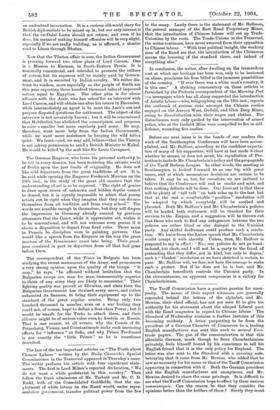Before our next issue is in the hands of our
readers the work of the Southampton Conference will have been accom- plished, and Mr. Balfour, according to the confident expecta- tion of many of his supporters, will have at last made it clear whether he means, or does not mean, his repudiation of Pro- tection to include Mr. Chamberlain's policy and the propaganda of the Tariff Reform League. In other words, the meeting at Southampton is looked forward to as one big with great issues, and at which momentous decisions are certain to be taken. It may be so, but, for ourselves, we are inclined to believe that the Conference will end in smoke and mist, and that nothing definite will be done. Our forecast is that there will be plenty of " tall talk " on both sides up to the last, but that at the end a comfortable "poultice" resolution will be adopted by which everybody will be soothed and placated. Both Mr. Balfour's and Mr. Chamberlain's policies will be lauded, both statesmen will be thanked for their services to the Empire, and a suggestion will be thrown out that those who seek to find any antagonism between the two policies are either blind or else disloyal to the Unionist party. Any skilful draftsman could produce such a resolu- tion. We know from the Luton speech that Mr. Chamberlain would accept it with alacrity. Unless, then, Mr. Balfour is prepared to say in effect : ' No ; our policies do not go hand- in-hand, but clash, and I will not be a party to the fraud of pretending that they differ, not in kind, but only in degree,' such a " blanket " resolution as we have sketched is certain to pass. Mr. Balfour will, we fear, not have the courage to make such a protest. But if he does not he is lost, and Mr. Chamberlain henceforth controls the Unionist party. In the circumstances, an apparent compromise is a victory for Chamberlainism.










































 Previous page
Previous page